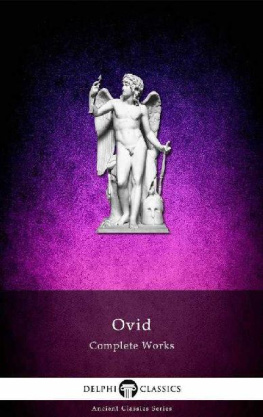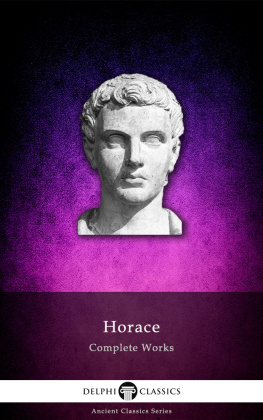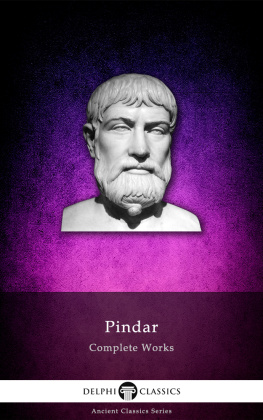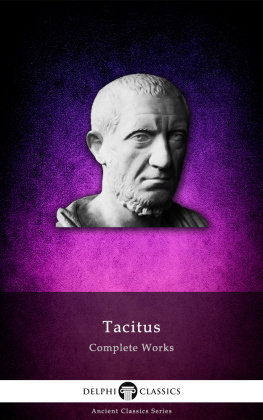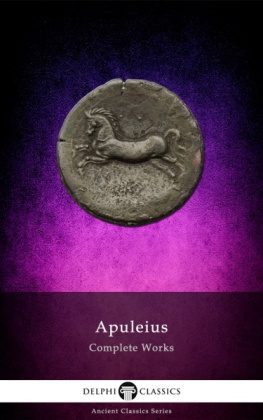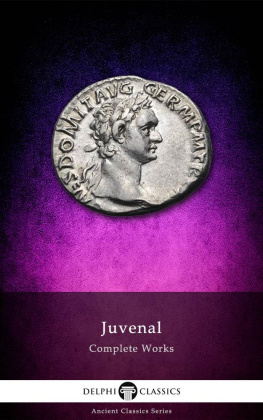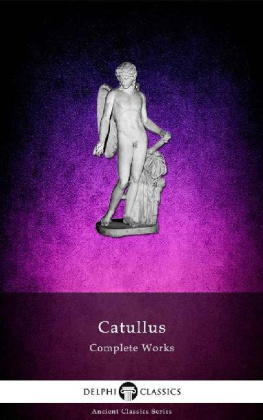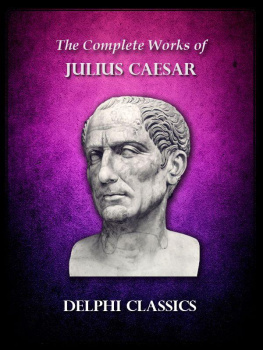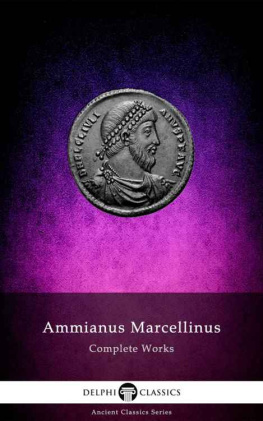The Complete Works of
OVID
(43BCAD 17/18)

Contents

Delphi Classics 2012
Version 1

The Complete Works of
OVID

By Delphi Classics, 2012
COPYRIGHT
Complete Works of Ovid
First published in the United Kingdom in 2012 by Delphi Classics.
Delphi Classics, 2012.
All rights reserved. No part of this publication may be reproduced, stored in a retrieval system, or transmitted, in any form or by any means, without the prior permission in writing of the publisher, nor be otherwise circulated in any form other than that in which it is published.
Delphi Classics
is an imprint of
Delphi Publishing Ltd
Hastings, East Sussex
United Kingdom
Contact: sales@delphiclassics.com
www.delphiclassics.com
The Translations

Sulmo, situated in an Apennine valley, east of Rome Ovids birthplace

Sulmo in the Middle Ages

The Statue of Ovid in Piazza XX Settembre, Sulmona, his city of birth
AMOURS (VERSE)

Translated by Christopher Marlowe
This is Ovids first completed book of poetry, written in elegiac couplets and published in 16 BC in five books, which were later edited to three books. It is formed of the popular model of the erotic elegy, established by poets such as Tibullus and Propertius, though Ovids poems are more subversive and humorous, exaggerating common themes and traditional devices of love poetry, revealing an imaginative and more modern approach to the genre, compared to the older poets.
Amores describe many aspects of love, as well as focussing on the poets relationship with a mistress called Corinna. Several of the poems describe events in their relationship, presenting a loose narrative. Comprised of 15 poems, Book I announces Ovids intention to write epic poetry, which is thwarted when Cupid steals a metrical foot from him, changing his work into love elegy.
In this edition of Ovids works, Christopher Marlowes translation of the Amours is available in verse, followed by a more literal 1930 translation in prose.

A medieval depiction of Ovid as a young man
CONTENTS
BOOK I
ELEGIA 1
Quemadmodum a Cupidine, pro bellis amores scribere coactus sit
We which were Ovids five books, now are three,
For these before the rest preferreth he:
If reading five thou plainst of tediousnesse,
Two tane away, thy labor will be lesse:
With Muse upreard I meant to sing of armes,
Choosing a subject fit for feirse alarmes:
Both verses were alike till Love (men say)
Began to smile and tooke one foote away.
Rash boy, who gave thee power to change a line?
We are the Muses prophets, none of thine.
What if thy Mother take Dianas bowe,
Shall Dian fanne when love begins to glowe?
In wooddie groves ist meete that Ceres Raigne,
And quiver bearing Dian till the plaine:
Whole set the faire treste sunne in battell ray,
While Mars doth take the Aonian harpe to play?
Great are thy kingdomes, over strong and large,
Ambitious Imp, why seekst thou further charge?
Are all things thine? the Muses Tempe thine?
Then scarse can Phoebus say, this harpe is mine.
When in this workes first verse I trod aloft,
Love slackt my Muse, and made my numbers soft.
I have no mistris, nor no favorit,
Being fittest matter for a wanton wit,
Thus I complaind, but Love unlockt his quiver,
Tooke out the shaft, ordaind my hart to shiver:
And bent his sinewy bow upon his knee,
Saying, Poet heers a worke beseeming thee.
Oh woe is me, he never shootes but hits,
I burne, love in my idle bosome sits.
Let my first verse be sixe, my last five feete,
Fare well sterne warre, for blunter Poets meete.
Elegian Muse , that warblest amorous laies,
Girt my shine browe with sea banke mirtle praise.
ELEGIA 2
Quodprimo Amore correptus, in triumphum duci se a Cupidine patiatur
What makes my bed seem hard seeing it is soft?
Or why slips downe the Coverlet so oft?
Although the nights be long, I sleepe not tho,
My sides are sore with tumbling to and fro.
Were Love the cause, its like I shoulde descry him,
Or lies he close, and shoots where none can spie him?
Twas so, he stroke me with a slender dart,
Tis cruell love turmoyles my captive hart.
Yeelding or striving doe we give him might,
Lets yeeld, a burden easly borne is light.
I saw a brandisht fire increase in strength,
Which being not shakt, I saw it die at length.
Yong oxen newly yokt are beaten more,
Then oxen which have drawne the plow before.
And rough jades mouths with stubburn bits are tome,
But managde horses heads are lightly borne,
Unwilling Lovers, love doth more torment,
Then such as in their bondage feele content.
Loe I confesse, I am thy captive I,
And hold my conquered hands for thee to tie.
What needes thou warre, I sue to thee for grace,
With armes to conquer armlesse men is base,
Yoke Venus Doves, put Mirtle on thy haire,
Vulcan will give thee Chariots rich and faire.
The people thee applauding thou shalte stand,
Guiding the harmelesse Pigeons with thy hand.
Yong men and women, shalt thou lead as thrall,
So will thy triumph seeme magnificall.
I lately cought, will have a new made wound,
And captive like be manacled and bound.
Good meaning, shame, and such as seeke loves wrack
Shall follow thee, their hands tied at their backe.
Thee all shall feare and worship as a King,
Jo , triumphing shall thy people sing.
Smooth speeches, feare and rage shall by thee ride,
Which troopes hath alwayes bin on Cupids side:
Thou with these souldiers conquerest gods and men,
Take these away, where is thy honor then?
Thy mother shall from heaven applaud this show,
And on their faces heapes of Roses strow.
With beautie of thy wings, thy faire haire guilded,
Ride golden Love in Chariots richly builded.
Unlesse I erre, full many shalt thou burne,
And give woundes infinite at everie turne.
In spite of thee, forth will thy arrowes flie,
A scorching flame burnes all the standers by.
Next page
